- Home
- Lee H. Haywood
The Guardian (The Gods and Kings Chronicles Book 2)
The Guardian (The Gods and Kings Chronicles Book 2) Read online
Contents
COPYRIGHT
TITLE PAGE
FREE OFFER
DEDICATION
THE WORLD OF LAVERIA
CHAPTER I
CHAPTER II
CHAPTER III
CHAPTER IV
CHAPTER V
CHAPTER VI
CHAPTER VII
CHAPTER VIII
CHAPTER IX
CHAPTER X
CHAPTER XI
CHAPTER XII
CHAPTER XIII
CHAPTER XIV
CHAPTER XV
CHAPTER XVI
CHAPTER XVII
CHAPTER XVIII
CHAPTER XIX
CHAPTER XX
CHAPTER XXI
CHAPTER XXII
CHAPTER XXIII
CHAPTER XXIV
AFTERWORD
BOOKS IN THE SERIES
GLOSSARY
THE WORLD OF LAVERIA
WESTERN LAVERIA
EASTERN LAVERIA
SOUTHERN LAVERIA
A WORD OF THANKS
Copyright © 2015 by Lee H. Haywood
All rights reserved. This book or any portion thereof may not be reproduced or used in any manner whatsoever without the express written permission of the author except for the use of brief quotations in a book review.
This is a work of fiction. Names, characters, places, and events are products of the author’s imagination and are used fictitiously. Any resemblance to actual persons, living or dead, or actual events is entirely coincidental.
Story Consultant and Editor: Kerry Haywood
Proofing: Sean Aiken and Kelly Beahan
First Published 2015
ISBN 978-0-9970810-0-8
www.leehhaywood.com
SUBSCRIBE
To Kerry,
the weaver of
my life’s great
fortune.
THE WORLD OF LAVERIA
CHAPTER
I
MANHERM
The wall had failed.
The smell of rot wafted from the field beyond, intermingling with the scent of sweat and iron. Below, a horse screamed, its body broken upon a spear. Karlan didn’t notice. He sat upright, slouched against the cold stone wall of the battlement, his head shifted skyward, taking in the dawning light with voided eyes. A poison arrow protruded from his forearm. An ignoble death, thought Bently as he eyed the general’s body warily.
“He’s gone. Throw him over with the others,” said Disias.
A collapsed siege engine lay burning beyond the wall, belching a column of black smoke into the air. They had been feeding it all night; ladders, refuse, fresh oil, and always more bodies. A few of the men still writhed and twisted in the inferno, desperate to crawl nowhere in particular, yet unable to free themselves from the entangled debris. Half of his division lay somewhere within the pyre.
“It’s not decent,” said Bently, rejecting the idea. He ran his hand through his short cropped hair, feeling the knots of scar tissue on his head.
“Decency has no part in it. A plague is a plague. Throw him over.” Disias nervously rubbed his hands together, warding off a chill that wasn’t there.
“Lord Disias is right, sir,” said Eldin, nodding to himself. He sat perched upon the battlement a few feet from the dead body, his feet dangling over the edge. His hands trembled as he absentmindedly whetted the same blade again and again. “Being highborn has nothing to do with it.”
Bently turned away from the conscript, ignoring his opinion. “We wait. It might be different this time,” Bently muttered almost to himself. He knew it wouldn’t. He bent over and collected the medallion pinned to Karlan’s chest, taking care to swat aside a fly that crawled across the dead man’s lips.
Bently rubbed his finger over the insignia, a red bear set beside a white tower. Karlan’s family would cherish the keepsake. Of course, it was a civilized gesture, made in deference to a world that no longer existed. The truth was, Karlan’s family was somewhere in Manherm, and Manherm was falling to pieces. They would never get the memento. They would never hear that Bently had done their father honor by not throwing him into the fire like a commoner. Guardsmen stick together in life and death. He placed the medallion in his pocket.
Disias snarled. “That doesn’t make you the commander.”
“No, it certainly does not,” replied Bently coolly. Bently’s hand shifted to his sword, his palm conforming to the familiar ivory grip. A hush fell over the gathering of soldiers. Disias’s fingers twitched near his hilt. Bently scowled. Steel is the only thing men are bound to respect in times like these.
A smile creased Disias’s face and he skirted out of reach, rapping his knuckle against the rondel of his sword. He bowed mockingly. “I’m going to Weaver’s Hall, captain. Best to make peace with the gods while one can. Time is short.” He bounded down the rampart steps before Bently could react, becoming lost in the passing confluence of people.
The streets below were packed to a near standstill. A man vainly attempted to shove through the crowd with a squealing sow under each arm. A women lamented for her missing child who had fallen underfoot. A horse panicked as it was blindly pushed along with the flow of traffic. Its headstall was yanked over its eyes, and a dead knight was seated backward upon its saddle, swaying lithely. Yanish brothers, garbed in yellow robes and conical caps, filtered amongst the masses in a parade of zealotry. Dirge bells chimed, flutes whistled, and all the while there was the ever-present smack of leather striking bare skin. Many of the atoning brothers had stripped to their loincloths and were flagellating themselves with barbed thongs for their transgressions. Bewildered orphans trailed in their wake like obedient ducklings, their bald heads raw and inflamed from a fresh shave. They were off to receive their final absolution, blissfully unaware of what that would portend. All were heading in the wrong direction, but no sensible words could turn this tide. Bently let the issue rest. The world was ending.
Smoke plumed to the east, casting a shadow over the city. The sphere of the sun dimmed. The eastern portcullis was raised, the wooden gate broken asunder. Black figures streamed through the opening uncontested. The white walls of Stone Keep shimmered in dancing flames, reflecting off the chopped waters of the Jasmine. The river meandered along the city’s south face, carrying in it the bobbing jetsam of desperate people. Skiffs and flatboats jammed the quay, and deckhands were throwing everything overboard to create space for the press of refugees. Some of the braver sailors cycled to and fro across the river, ferrying people to safety, while others abandoned their ships on the far shore and ran for their lives.
The press on the dock intensified. Bodies began to plummet into the churning water, a cascade of flailing arms and legs. Black shapes were suddenly teeming in amongst the people, biting and gouging. A terrible wail rose from the crowd, coalescing into a constant hum like the thrumming buzz of a hornet’s nest. Humanity always toed a delicate line, and now the last modicum of civility vanished. People clambered over each other, frantic to escape.
Most of the men atop the wall looked on, stupefied. Their faces showed no semblance of comprehension. “Do we go to their aid?” said Duffry, an obtuse man who hadn’t the sense to know there was nothing they could do.
“No use...no use at all,” stuttered Eldin. He had seen too much for one lifetime, and viewed the chaos with a degree of aloofness. “The battle has moved on, captain. No use to stay here either. No use to stay anywhere, in truth.” He set his hands on a ladder left from the enemy’s failed assault. The man’s crazed eyes shifted nervously from the field to Bently and back again, waiting to see
if Bently would stop him. All enmity passed from Bently’s heart. These men were conscripts; they had sworn no oaths of loyalty. Bently gestured for Eldin to leave, consenting to the man’s cowardice. Without further hesitation, Eldin squeezed his legs through the crenelation and scampered down the ladder to the ground. Another followed, then another, until the whole battlement was emptied save Bently and Karlan.
Bently watched the men zigzag as they dashed amongst the bodies in the killing field, sending carrion birds into a pluming contrail. The birds cawed and screeched, their bodies bloated from the feast. The men gave the Wraith King a wide berth.
Set in the middle of the field hung the body of King Johan, placed there so the whole city could bear witness to his turn. His brow was still twisted in a grimace. His purple cape fluttered in the wind, tugging fruitlessly against the gold clasp that held it fastened to galled flesh. His ruby-studded crown rested askew atop his head, offset by the spear that protruded from his shoulder. He was spitted atop the hill like a macabre scarecrow. The white bone of his chest stood in stark relief against a cavity of red. About his dangling feet lay the vanquished banners of his house, crushed into the mire.
There lies my loyalty, Bently thought. There lies the death of one world.
Johan’s head lifted, casting his visionless gaze over the killing field. Finally, the pallid orbs of his eyes settled upon Bently. His jaw shifted and the sinew of his neck bulged. Slowly his cankered lips parted, his blue tongue rising and falling in a slow purposeful drawl, mouthing the same pattern Bently had seen countless times now. The words were lost on the wind. A cold shiver ran down Bently’s spine.
“When the dead live, may the gods have mercy.” Bently looked away from the unsettling apparition.
On the horizon, the tear-shaped outline of a willow was barely visible. He imagined two figures stood beneath it awaiting favorable news. By now they had doubtlessly seen the pall of smoke that belied any hope. He reached toward the tree contritely. He should have sent them to the Nexus. Now it was too late.
Bently stroked the wood of the ladder. Hard pine, soaked in water to ward off flame. It would be simple; one leg over the divide, and then the next. He would have to outrun the scavengers, but they were preoccupied. A thousand men lay dying on the field, pleading for help. This seemed to only enliven the sanguinary lust of the foragers. Figures with serpentine faces roamed the butchered bodies like vultures, stripping away swatches of cloth from the wounded. One by one the murmuring voices were extinguished. The dragoons emerged swaddled in the cloth of their victims.
In the distance a bell tolled fervently, alerting the townspeople of fire. He wondered what tractable fool manned the bell tower, extolling a needless warning to a doomed city. The world was ending, and the bellman thought it wise to welcome it. Bently wished he possessed such blind loyalty, but his loyalty lay far afield, beneath the boughs of that tree.
He set one foot on the ladder rung.
There was a rustle beside him. Karlan’s tongue was clacking against the roof of his mouth and his teeth began to gnash. Pale fingers involuntarily dug into the hard stone slabs of the rampart, ceaselessly delving into the unrelenting surface until his fingernails tore loose. With a lurch Karlan rose to his feet, as if the necromancer had come and whispered an incantation directly in his ear, bidding him to rise.
Death and rebirth, thought Bently. He sighed and dismounted the ladder. Girding himself, he raised his greatsword above his head. He wondered if there was anything left of Karlan behind those voided eyes. He blinked away the disquieting thought and split Karlan from neck to armpit with one heavy swipe.
The two halves of Karlan’s body fell from the battlements, almost striking a startled boy who was sprinting up the rampart stairs.
The boy looked at the body in disgust, clearly noting the epaulets that beset each of Karlan’s separated shoulders. “Where are your men, captain?” said the boy to Bently.
Bently looked at him queerly. A stunted youth, barely old enough to swear the oath of brotherhood. A lie would suffice to get the courier to go away.
“Dead on the field.”
“General Waymire has ordered all men to gather at the Waterways.”
“Lady Manherm?”
“We are rallying to her banner.”
“A final push for the lordess?” mulled Bently. Waymire somehow defrayed the lives of a hundred thousand people against that of Evelyn Manherm, willfully surrendering the city to aid her escape. Bently was certain her life did not measure equally to the two lives he would be leaving behind if he followed Waymire’s command. He looked to the willow wistfully, but it was gone, hidden behind a shifting haze.
This is how the world ends, realized Bently. Not the earth, for it was timeless and without limit. But his world. The world of smiling faces and careless laughter, of warm embraces and days worth living. This is how men die without dying.
He turned away from the willow, wiping all sign of dourness from his face, and took on the stern countenance of a captain. “My sword is ever hers to command.”
He pushed the ladder away from the wall, sending it clattering into the fire. He followed the courier, going in the opposite direction that his heart commanded.
He did not see the willow beset by a sea of flame.
He did not see his world come to an end, yet he felt it all the same.
CHAPTER
II
CARRIONS
“My lord, a formation is advancing to the east. It appears the way is blocked.” The scout stood at attention, holding his salute. Rancor noted the flaring whites of the scout’s eyes and the telltale quiver in his voice. He was afraid of whatever he saw, just like the others.
“And we can hardly ford the river.” Rancor motioned to the swift water that ran adjacent to the meadow they were standing in. It was swollen from the recent arrival of spring, and the rolling black current broke in turbulent waves. Rancor felt like such a damned fool. He had done this to his men, letting them get cornered like a hunted deer.
“They would have us head west. Catch us in the narrows between the Jasmine and the Marlan,” said Rancor, speaking mostly to himself. “Or worse, they have reinforcements hiding within the woods.” He eyed the forest with uncertainty. “Where is Prince Desperous?”
A stout elf cloaked in the red cape of the High Tower Guard presented a map, jabbing at the parchment. “My estimates would put the First Army about here,” said Nerso. He was the captain of Rancor’s personal guard.
“He’ll not reach us before sundown,” said Rancor, eliminating their one hope at salvation. He pensively thumbed the feather of an arrow that hung in the quiver at his hip. He cursed himself. Indecision was bound to get them all killed, and here he was dawdling as if he had time to waste.
They had begun the day pursuing what was believed to be a group of bandits harrying the contested borderlands that lie west of the Marlan. Now they found themselves in flight from a division of soldiers bearing the white tower of Caper on their surcoats. The pursuers had become the pursued, and in move after foolish move, Rancor had allowed his men to be driven toward the impassable river. Now they were trapped against the banks of the Marlan, and there was no one to blame except himself. Expectant faces looked at him from all directions, each man certain that their high lord knew the way to victory. They deserve better than me, thought Rancor gloomily. The men were loyal to a fault.
“What of the treaty, High Lord?” whispered General Bailrich, so that only Rancor could hear. His polished steel breastplate made him stand out like a jewel amongst the drab, livery-clad men about them.
Rancor scowled. Treaties were only reliable if the men who signed them could control their people. King Johan had lost the ability to compel his lords through force years ago, and the gold caps in his coffers were ever-dwindling. If Rancor had to guess, they were being pursued by a border warden seeking reprisal for some perceived slight. Rancor’s corpse would serve as an unexpected trophy to be found after the battle.
The treaty would do nothing to protect them today; battle was coming whether he wanted it or not.
Rancor drew his sword. The burnished steel caught the flare of the morning sun, causing it to blaze with an ephemeral light. He pointed the tip of his blade in the direction of the woods, sighting down the blood groove. “Truce breakers pay a dire price. Beyond is a man who would have the peace between our lands broken. Hear me and be comforted; this aggression will not go unchecked. I welcome his challenge!” A halfhearted cry of approval rose up from his men, confirming in Rancor’s heart what he had feared; his men wished to fight no more than he did. “I state this before all of you so that there is no confusion in my message — we face unfavorable odds. The men of Caper have our flight blocked in two directions. I will lay my petition before you all. We can fly the field, hoping to outrun any ambush that lay in wait, or we can face the onslaught here. Voice your opinions now.”
Rancor paced before the small army, looking from one man to the next. Much of their countenance was overshadowed by the lip of their bronze helmets; still, Rancor detected furrowed brows and uncertain grimaces. None wished to prove the coward and be the first to speak out in a dissenting voice. In the ensuing silence, Rancor could detect the faint thrum of drums wafting from the forest beyond. The presence of the enemy drawing near solidified the decision in each man’s mind.
“We fight for our high lord!” roared Captain Nerso, speaking for the High Tower Guard.
Beside him, General Bailrich pumped a pair of spears aloft, spurring the soldiery to respond. Men began to mimic the general’s motions, filling the air with the clank and rattle of clashing blades.
Rancor nodded in approval. Smacking the hilt of his sword to the tri-rays emblem embossed upon his chest, he yelled out to his men, “For Luthuania!”
The rally cry came back in unison, “For Luthuania!”

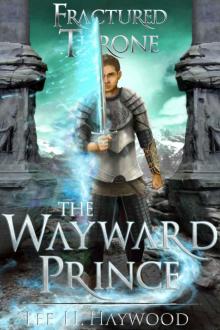 The Wayward Prince
The Wayward Prince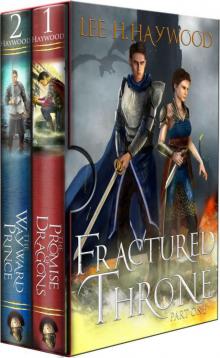 Fractured Throne Box Set 1
Fractured Throne Box Set 1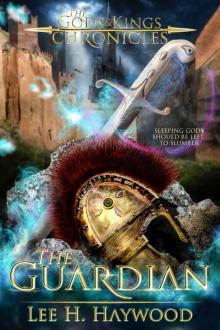 The Guardian (The Gods and Kings Chronicles Book 2)
The Guardian (The Gods and Kings Chronicles Book 2)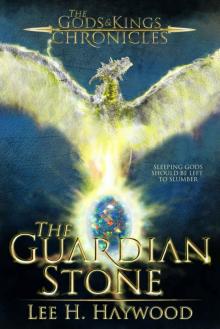 The Guardian Stone (The Gods and Kings Chronicles Book 3)
The Guardian Stone (The Gods and Kings Chronicles Book 3)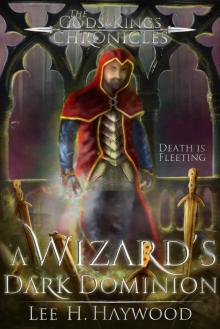 A Wizard's Dark Dominion (The Gods and Kings Chronicles Book 1)
A Wizard's Dark Dominion (The Gods and Kings Chronicles Book 1)